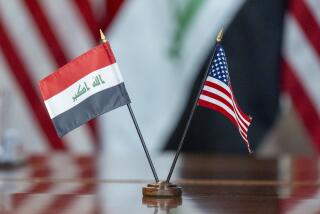Attacks kill 5 U.S. troops, 14 Iraqis
BAGHDAD — Five American soldiers were killed Monday in a rocket attack in Baghdad, the military said. It was the deadliest attack this year against U.S. forces here and underscored the dangers American troops still face as they prepare to withdraw by the end of 2011.
The attack came as Iraqi officials touted the end of a 100-day period called by Prime Minister Nouri Maliki to improve governmental services. But ordinary Iraqis appeared to greet the milestone with a shrug and skepticism that anything was improving as violence claimed the lives of at least 14 Iraqis.
An Iraqi security source said that the five U.S. soldiers had been serving as advisors for Iraqi national police at a base in east Baghdad. Their quarters were targeted by rocket fire shortly before 7 a.m.
U.S. military officials, however, declined to comment further on the attack.
The deaths raise the number of U.S. soldiers killed in Iraq since March 2003 to 4,459, according to the independent website icasualties.org. Both Shiite and Sunni extremist groups are eager to target the Americans to make the claim that they drove U.S. forces out of the country.
East Baghdad is rife with Shiite Muslim militia groups, including radical cleric Muqtada Sadr’s elite fighting unit, the Promised Day Brigade, as well as a splinter group called the League of the Righteous.
Eleven U.S. soldiers were killed in April, and two died last month in attacks. An estimated 46,000 American troops remain in Iraq on about 66 bases. U.S. troops are currently training Iraqi forces and conducting joint operations, notably with Iraq’s counter-terrorism units. They also guard diplomatic teams traveling around the country.
The U.S. military expects its numbers to stay even through the end of summer. Its biggest bases in Baghdad, western Anbar province, the northern provinces of Nineveh and Salahuddin, along with important hubs in the south near Hillah and Nasiriya, will not be handed over until December.
Military officers say they are bracing for attacks to continue until their departure, especially from Sadr’s fighters and other Shiite militias.
“We’ve anticipated that they would attack us and try to ramp up their attacks though various militias this year and essentially claim credit for us leaving,” military spokesman Army Maj. Gen. Jeffrey S. Buchanan said in a recent interview.
Already, the U.S. military has acknowledged an increase in attacks carried out with more powerful weapons.
“We have had over the past several months in March, April and May an increase compared to where we were in, say, February or January,” Buchanan said.
But he emphasized that the number of attacks was consistent with figures from recent years after violence dropped from the levels seen during Iraq’s sectarian conflict.
He warned that there had been an increase in the use of larger-caliber 120- and 240-millimeter rockets, which he said were Iranian-made and probably smuggled in across the eastern border with Iran. “Obviously ... the bigger rocket means a potentially longer range, a potentially bigger warhead and a potentially worse impact,” Buchanan said.
In Baghdad, Iraqi State Minister Ali Dabbagh and Cabinet Secretary-General Ali Alaq reviewed the government’s achievements at the end of the 100-day period to review and overhaul services. They said a committee created by the prime minister had issued 65 recommendations. The government had made strides fighting corruption, they said, and would now be coordinating weekly with a U.N. agency to ensure better services.
Maliki, who suggested in May that he might sack any ministers who had shown themselves deficient, was expected to study the recommendations, as well as the performance of ministers, in the days ahead. He announced the 100-day period on Feb. 27 in the face of the popular revolts sweeping the Arab region and a string of demonstrations and clashes between protesters and security forces in Baghdad.
In a sign of the trials ahead for Iraqis and U.S. troops, a car bomb exploded by a checkpoint in Tikrit, north of Baghdad, at a governmental compound where Iraqi soldiers were gathered. At least 14 people were killed and 26 wounded. Among the dead were an Iraqi brigadier general and nine other soldiers and officers. The same area was targeted Friday in bombings that left 23 dead.
The general population seemed deeply cynical about the government’s plans at the end of the 100-day review period.
“Does Maliki or the government have a magic wand to change things?” asked Muhannad Abbas, 25, a pharmacist. “We are [living] in a disturbed, destabilized and even destroyed country. What can be done during these 100 days?”
Salman is a Times staff writer.
More to Read
Sign up for Essential California
The most important California stories and recommendations in your inbox every morning.
You may occasionally receive promotional content from the Los Angeles Times.









